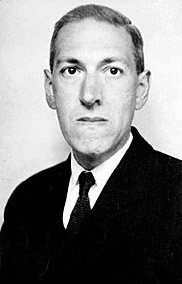August 20 in Science Fiction and Fantasy

H. P. Lovecraft
Howard Phillips Lovecraft (August 20, 1890 – March 15, 1937), author of the Cthulhu Mythos story cycle, is regarded as one of the most influential horror writers of the 20th Century. Stephen King, claiming Lovecraft as the single biggest influence on his own fiction, called him “the twentieth century’s greatest practitioner of the classic horror tale.”
His father, a traveling salesman, became psychotic when Lovecraft was three, and spent the remainder of his life in a psychiatric hospital. Lovecraft maintained the cause of his father’s illness and eventual death was “nervous exhaustion,” although later researchers have concluded that it was syphilis. His mother would later be committed in the same hospital for hysteria and depression, dying there when Lovecraft was 29.
An intellectual prodigy, Lovecraft was reading at the age of three and writing at the age of six. He was frequently ill as a child, and didn’t attend school regularly until high school. He suffered from night terrors. His grandfather, the family’s major financial support, died in 1904 and the family moved into smaller accommodations. Lovecraft suffered another nervous breakdown and dropped out of high school before finishing. He published small hectographed amateur magazines and studied astronomy, hoping to enter the field professionally. He couldn’t handle the higher mathematics required, however.
He continued in amateur publishing, joining the United Amateur Press Association in 1914. He developed a huge network of correspondents, including future fantasists Robert Bloch of Psycho fame, Clark Ashton Smith, and Conan creator Robert E. Howard. Lovecraft was famous for prodigiously long letters, some in excess of 100 pages. He met his wife Sonia at an amateur journalism convention, but divorced a few years later. He returned to live with his aunts for the remainder of his life, dying of cancer and malnutrition.
In Lovecraft’s fiction, characters often seek forbidden knowledge, but that knowledge drives them mad. Often, the forbidden knowledge involved the Elder Gods, their human worshippers, and the danger of their imminent return. Characters often suffered from inherited guilt or were victims of implacable fate. Lovecraft’s racism is unfortunately clear in his work, and in his own life he was an advocate of a strong “color line” against non-Anglo Saxon races and cultures. Although he himself was strongly interested in astronomy and chemistry, Lovecraft’s writing focuses on the risks of scientific discovery, especially in stories such as The Color Out of Space.
Relatively unknown during his life, Lovecraft’s posthumous influence has grown to major proportions. Lovecraftian themes influence many modern horror and fantasy writers, and the Cthulhu Mythos itself has entered the popular culture, from role playing games to bumper stickers. (“Why vote for the lesser evil? Cthulhu in 2012!”) Many of his works have been adapted into films, comics, music, and other media, and numerous writers have added their own stories to the Mythos. Lovecraftian tropes from the mythical Miskatonic University and the infamous Necronomicon also show up in a variety of other media.
 |
| Sir Fred Hoyle, FRS |
Sir Fred Hoyle
Astronomer and science fiction writer Sir Fred Hoyle (June 24, 1915 – August 20, 2001) was known in scientific circles for his work on stellar nucleosynthesis, and for his (incorrect) advocacy of his own “steady state” theory. He also believed that the origin of life on Earth was due to panspermia (bacteria from other worlds) rather than abiogenesis (evolving from our own “primordial soup”). Often involved in scientific controversies, Hoyle was famously bypassed in the 1983 Nobel Prize for Physics, given for work in nucleosynthesis, in spite of his contributions to the field.
His science fiction work began with the 1957 novel The Black Cloud, and included a television series, A for Andromeda, later adapted as a novel. He frequently wrote with his son Geoffrey Hoyle. In addition to science fiction, Hoyle published a number of nonfiction books.